The following is a Computing Research Association Government Affairs Blog post by CRA Policy Analyst, Brian Mosley. Mosley served as the co-chair of the report “Second Place America?” Major Report Detailing the Nation’s Declining Leadership in Research and Technology and helped organize a Task Force on American Innovation (TFAI) report release event on Tuesday, May 14th. One of the speakers at the release was Computing Community Consortium (CCC) executive council member Nadya Bliss from Arizona State!
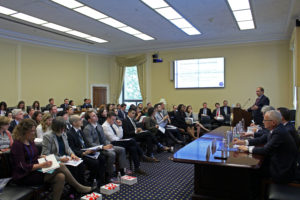
An audience of Congressional staffers and science policy professionals listen as Tobin Smith, Association of American Universities, discusses the findings of the Benchmarks report.
On Tuesday May 14th, the Task Force on American Innovation (TFAI), an alliance of leading American companies and business associations, research university associations, and scientific societies, released a major report assessing the United States’ investment in science and engineering research. The report, titled “Benchmarks 2019: Second Place America? Increasing Challenges to U.S. Scientific Leadership,” is the fourth such “benchmarking” report that TFAI has released since it’s founding in 2004. The report found that the trends found in the original Benchmarks report in 2005, and the two subsequent follow-up reports, persist and the U.S. continues to lose ground to other nations in investments in science, technology, and talent.
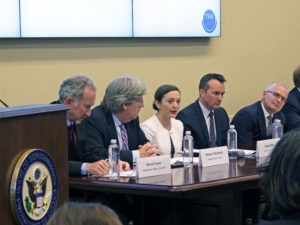
Nadya Bliss, of the Global Security Initiative at ASU, brought a researcher’s perspective to the panel discussion.
In order to assess the country’s standing against competitor nations, the report is broken into five distinct categories of benchmarks: R&D investments, knowledge creation (such as scientific publications and patents), education, workforce, and several high-tech sectors. In all the categories, signs point to the U.S. losing it’s competitive edge, as China and other countries rapidly increase investments in research and workforce development in order to assume positions of global leadership. The report makes clear that the U.S. needs to capitalize on its tremendous assets and make technological pre-eminence a national priority. This can be achieved through a national strategy that includes increased funding for scientific research and human capital development, and targeted investments in new programs to grow, attract, and retain domestic and international STEM talent.
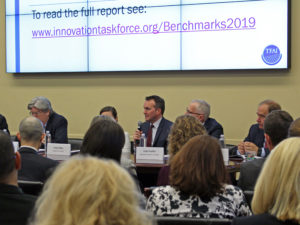
Eric Fanning, Aerospace Industries Association, speaks about the impact on industry.
The report was released at an event on Capitol Hill in the Rayburn House Office Building, with honorary co-hosts Rep. Eddie Bernice Johnson (D-TX) and Rep. Frank Lucas (R-OK), the Chair and Ranking Member of the House Science, Space, and Technology Committee, respectively.
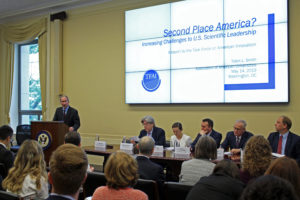
David Isaacs, Semiconductor Industry Association (podium) moderated the panel discussion at the release of the TFAI Benchmarks Report.
The majority of the event was devoted to a panel discussion of the report’s findings by key industry and scientific leaders. The panelists included Eric Fanning, former Secretary of the Army and current President and CEO of the Aerospace Industries Association; John Neuffer, President and CEO of the Semiconductor Industry Association; Michael McQuade, Vice President for Research at Carnegie Mellon University; and Nadya Bliss, Director of the Global Security Initiative at Arizona State University. These speakers represent the three parts of the U.S. innovation ecosystem (industry, universities, and researchers), and they had a clear message: the nation needs a strong and sustained commitment to increasing federal investments in scientific research and human talent if the nation wants to maintain its global leadership role.
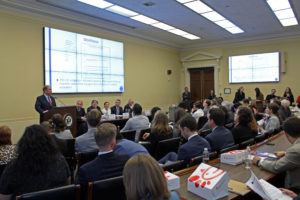
Tobin Smith (AAU), one of the co-chairs of the Benchmarks report, briefs the attendees on the report findings.
Tobin Smith, of the Association of American Universities, and one of the report co-chairs, said, “this is a wake-up call for policymakers in Washington. Maintaining a global lead in science is critical to American national security and economic interests. But this report clearly documents that the rest of the world is catching up very quickly.”
CRA played a key role in the development and release of this report. Dr. Bliss, who provided the researcher perspective at the Capitol Hill event, is a Computing Community Consortium Council member. Additionally, I served as the other co-chair of the report. CRA was among the first members to join TFAI in 2004, and had a major role in authoring the first Benchmarks report in 2005.









